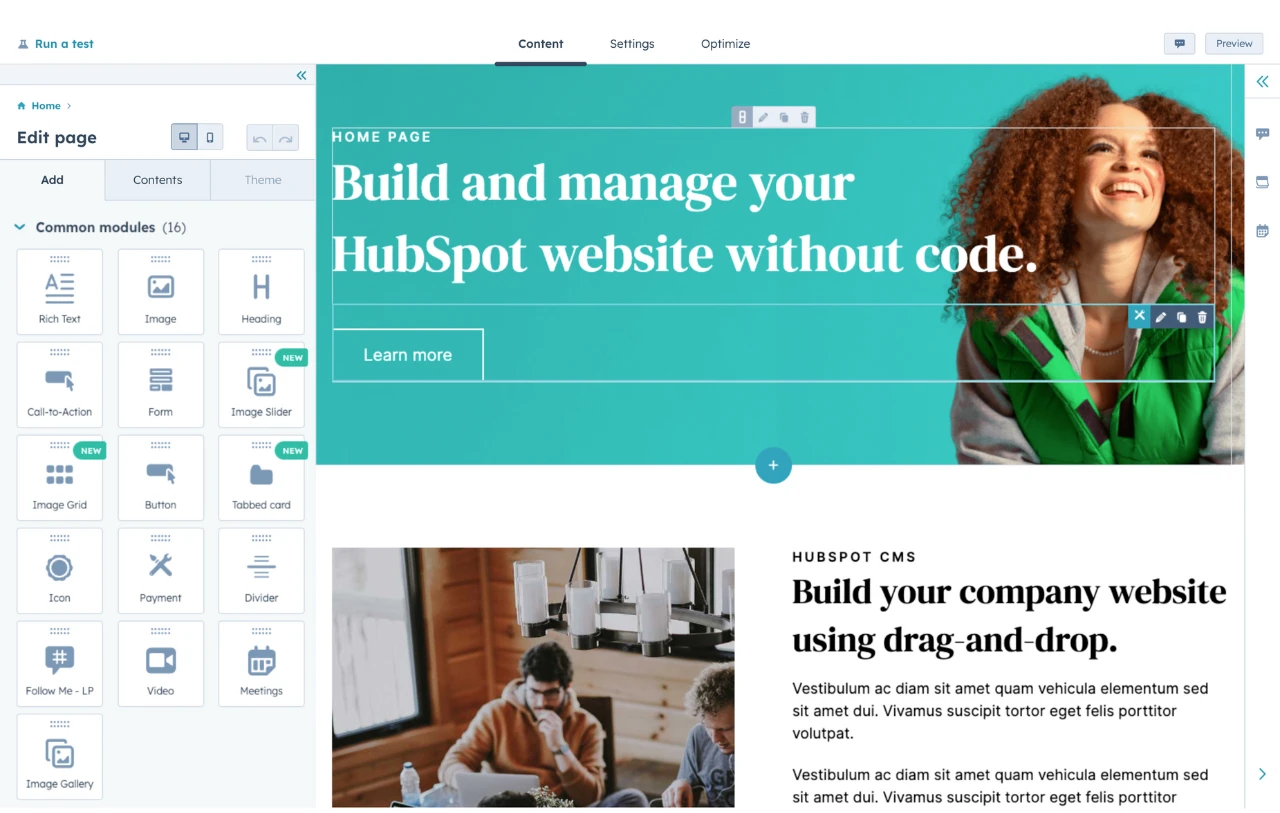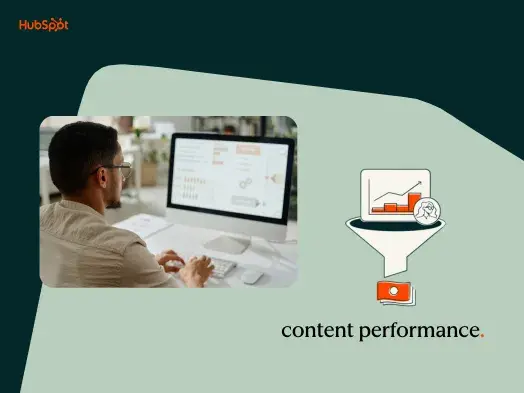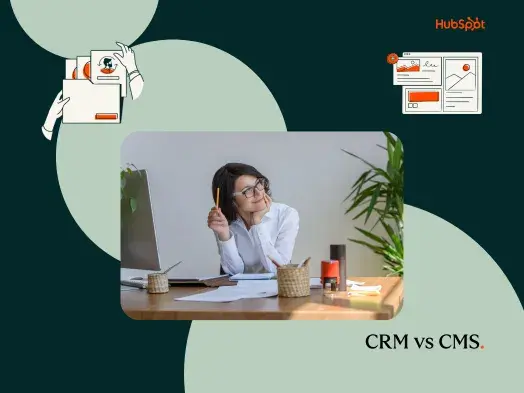Let's dive into the details of why you might want alternatives to Wix, bust some unfair myths about the platform, then look at six of your best options.
Summary: If you’re short on time and just want the bird’s-eye view, here are the top four Wix alternatives for specific use cases:
- Content Hub: Best for businesses wanting more advanced CRM and business tools than Wix offers.
- Hostinger: Best for beginners seeking an easy-to-use website builder that’s cheaper than Wix.
- Shopify: Best for online stores requiring more advanced ecommerce capabilities than Wix can offer.
- WordPress: Best for website owners desiring the most SEO flexibility.
Table of Contents
- Why You Might Want a Wix Alternative
- Is Wix “bad for SEO?”
- Best Wix Alternatives
- FAQs About Wix Alternatives
- Which Wix alternative will work best for you?
Why You Might Want a Wix Alternative
While Wix is praised for its ease of use for beginners, it has received criticism for its high pricing compared to other builders, template lock-in, performance and speed issues, and limited flexibility for growth.
High Pricing for Premium Features
Is this pain point unique to Wix? Partially.
Wix is not the cheapest website builder on the market. In my opinion, you can get more value with competitors like Squarespace, which also has a beginner-friendly drag-and-drop editor and offers ecommerce features on its cheapest plan ($16/mo on annual billing). Wix, on the other hand, requires you to upgrade to its $29/mo plan to access ecommerce features.
That $29-per-month price point is matched by Shopify, which is a much more advanced and purpose-built ecommerce platform. In short, if you‘re an online store looking for premium ecommerce features, Wix isn’t the most competitive there.
Template Lock-In Problem
Is this pain point unique to Wix? Partially.
For me, this is the biggest downside of using Wix: After you launch your site, you can’t switch templates (your website’s premade design) without starting over. This is bonkers to me, as I am an avid WordPress user, and I have switched themes multiple times (it’s all part of doing business; brands evolve over time).
However, Wix isn’t totally alone in this. When Squarespace upgraded from 7.0 to 7.1, it removed the ability to switch templates because all Squarespace 7.1 websites are built on the same template family.
Limitations on Advanced SEO Tactics
Is this pain point unique to Wix? Partially.
- Static pages are limited to 100 max. Wix limits sites to up to 100 static pages, which can be a real constraint for businesses pursuing programmatic SEO.
“It's fine for early- and mid-stage businesses, but most companies with sophisticated SEO strategies will outgrow this fairly quickly,” says Claire Ransom, owner of SEO agency Aloha Life Digital, who regularly works with businesses using Wix.
Blog posts and articles don’t count toward this limit (Wix blogs can support up to 100,000 posts) because they’re managed separately in the CMS. The static page cap mainly affects custom pages like service pages, location pages, and landing pages — the kinds of pages businesses rely on for SEO and lead generation at scale.
If most of your growth comes from blogging or a small number of core pages, this limit probably won’t affect you. But if you’re a multi-location business or competing in local search and need dozens or hundreds of pages like “plumbing repair in [city]” or “marketing services for [industry],” it can become a real limitation.
To be fair, other hosted website builders have page limits, too. For example, Hostinger’s cheapest website builder plan limits you to only five total webpages, so it wouldn’t be possible to do any sort of programmatic SEO on that plan either. - Structured data markup is limited to 7,000 characters per markup. This seems unique to Wix, as I didn’t find such a constraint for any of the other builders mentioned in this article.
I reached out to Gabriel Bertolo, who’s been a web designer and SEO for 13 years and founded Radiant Elephant. "After numerous experiences with Wix, I refuse to do SEO for Wix Sites anymore,” he told me. “When a client comes to me with a site built on Wix, I recommend that the site be rebuilt on WordPress."
Bertolo points to code bloat, poor performance, and generic designs as Wix downsides, but his main gripe? Its structured data character limit.
“Advanced schema markup is an important part of my on-page SEO strategy, and Wix limits structured data code to 7,000 characters," he says. "The advanced schema markup I add to sites often exceeds 30,000 characters. This limitation makes my on-page SEO strategy impossible.”
For most people doing basic SEO, this limit probably won't matter. I’ve been doing SEO for over a decade and have rarely touched schema. But for advanced SEOs, it can be a real problem.
Performance and Speed Concerns
Is this pain point unique to Wix? No, it plagues many hosted website builders.
Wix has received lots of criticism for being slow and having bloated code (specifically due to JavaScript). This criticism is tricky because code bloat is common among all no-code website builders.
In 2024, the folks at Seobility ran a real-world test by building a small site on Wix's Core plan. They concluded: “Wix has come a long way over the past few years, and they now cover control of most of the SEO basics reasonably well. But speed and code bloat are still important issues we hope they’ll continue working on in the future.”
Here’s what they had to say about code bloat:
“Wix has a TON of code bloat compared to sites developed from scratch. ... Most (but not all) WordPress page builders also generate similar, messy, bloated, unoptimized code. The same is true for other page builders/CMSs, including Weebly, Squarespace, Magento and various others.”
Is Wix “bad for SEO?”
“Wix is fine for SEO,” Google’s John Mueller clarified in a Reddit post in 2021.
Wix has come a long way in terms of SEO capabilities in recent years. It even established an SEO Advisory Board.
“Wix at this point is now just light years ahead of where they and others used to be,” says Emmanuel Tamrat, founder of Blindspot Agency, who has ranked Wix sites to page one for competitive local searches.
“The sites now perform well,” he adds. “They load quickly on desktop and mobile. They look phenomenal.”
When someone tells you not to use Wix, ask whether their issue is with Wix specifically or all hosted website builders. Often, it's the latter. Advanced SEOs and developers typically dislike any hosted builder because they're inherently limited. But that’s the point: These tools are built for non-technical users, not developers.
For marketers, creatives, and small business owners, hosted website builders like Wix are perfectly fine. No, you’re not going to have unlimited control of schema markup or be able to fine-tune the back-end architecture or change your web hosting provider, but they work for what they’re meant to do: make it easy for anyone to build and launch a website, without needing to code.
That said, there are still legitimate reasons to consider Wix alternatives. Whether you need more flexibility, advanced ecommerce, or a lower price point, let's explore the best options below.
|
Wix Alternative |
Best For |
Starting Price |
Key Features |
Notable Limitations |
|
Content Hub |
Teams wanting an all-in-one website builder with CRM, marketing, sales, and service tools |
Free plan available; paid plans from $9/mo/seat (annual, promotional) |
Native CRM integration; advanced content workflows; marketing, sales, and service tools in one platform |
Advanced features cost more than Wix; less robust B2C ecommerce features |
|
Hostinger |
Users wanting ease of use and affordability |
$3.49/mo (12-month contract, promotional); renews at $10.99/mo |
170+ templates; AI tools (text editor, image generator, SEO assistant); mobile editor; ecommerce plan at $4.49/mo |
Cheapest plan limited to 5 total pages |
|
Squarespace |
Creative professionals wanting sleek portfolio designs |
$16/mo (annual billing) |
Award-winning templates; true drag-and-drop editor; ecommerce on cheapest plan |
Limited extensions; no 500+ app marketplace like Wix |
|
WordPress.org |
Website owners wanting full control over code, design, and hosting |
Free CMS; total cost $30–$3,000/year (hosting, domain, plugins) |
14,000+ free themes; 60,000+ plugins; largest resource ecosystem; full customization |
Steeper learning curve; must manage own hosting, security, and maintenance |
|
Shopify |
Online stores needing robust inventory management, multichannel selling, and global reach |
$29/mo (annual billing) |
100+ payment gateways; POS in “nearly every country”; 8,000+ app integrations; automatic hosting/security |
0.2–2% transaction fees on third-party gateways; deep theme customization requires Liquid coding |
|
Google Sites |
Small businesses on a shoestring budget |
Free |
No vendor branding; free custom domain connection; integrates with Google apps (Gmail, Drive, Docs, Forms) |
Extremely limited functionality; very few templates; no ecommerce features |
1. Content Hub
Best for: Teams wanting an all-in-one website builder with an advanced CRM, plus marketing, sales, and service tools
Why Use Content Hub Over Wix: Wix is a hosted website builder designed for individuals and small teams that want to get a site live quickly with minimal setup. HubSpot Content Hub is content marketing software built for growing businesses that want their website tightly connected to a CRM, plus marketing, sales, and service tools.
The key difference is how well the website supports long-term growth. Content Hub is better suited for teams that need advanced content workflows and native connection to email marketing, lead management, and analytics. This makes it a stronger option for businesses using their website as a main growth channel, not just a digital brochure.
Content Hub Cons: Access to advanced features of Content Hub typically costs more than Wix and can be excessive for solo founders or very small sites. If you don't need CRM integration, advanced reporting, or multi-user collaboration, Wix may still be the simpler and more cost-effective choice. There is a free plan for Content Hub, but it comes with limited features. Additionally, compared to Content Hub, Wix has stronger built-in B2C ecommerce features, such as inventory tracking and a shopping cart.
Content Hub Website Example: When Coke Northeast redesigned its website, it chose Content Hub as its CMS, resulting in higher traffic and community reach.

Price
Content Hub offers a free plan. Paid plans start at $9/mo/seat on annual billing (promotional rate).
2. Hostinger Website Builder
Ideal for: Users wanting to strike a balance between ease of use and affordability
Why Use Hostinger over Wix: A compelling alternative to Wix, Hostinger Website Builder offers reliable web hosting and a beginner-friendly visual editor at an affordable price.
Hostinger Website Builder lets you create a website instantly with AI or by customizing one of its 170 pre-made templates. With its intuitive editor, you can drag and drop any site element anywhere on the page, guided by its “smart grid,” which I love because it ensures I stay within some kind of framework.
The builder also comes with a mobile editor so you can design and manage your website on the go, right from your smartphone browser. Hostinger Website Builder has many AI tools, including an AI text editor, an AI image generator, and an AI SEO assistant, making website creation even easier.
Like Wix, Hostinger requires that you upgrade to a higher tier to access ecommerce features. But Hostinger‘s ecommerce-enabled plan (Business Website Builder) is still substantially cheaper than Wix’s, at only $4.49/mo on a 12-month contract compared to $29/mo on Wix.
On top of that, Hostinger Website Builder includes an email inbox for free for the first year, while with Wix, a professional email account is sold separately.
Hostinger Cons: Hostinger Website Builder’s cheapest plan limits you to only five website pages total. That’s astonishingly low but might be fine for simple websites, such as a portfolio or brochure site.
Hostinger Website Example: Writer Jared McCormack built his portfolio site on Hostinger Website Builder.

Price
On a 12-month contract, Hostinger Website Builder starts at $3.49/mo (promotional rate). It renews at $10.99/mo. It offers a free 14-day trial of its AI website builder.
3. Squarespace
Ideal for: Creative professionals wanting the sleekest designs for a portfolio site
Why Use Squarespace Over Wix: If you need to create an online portfolio, I think you’ll be better off with Squarespace. While it offers fewer templates than Wix, the selection it does offer is award-winning and highly customizable. Squarespace is where I chose to build my freelance writing website after years on WordPress. It offers an intuitive visual editor with true drag-and-drop functionality, assisted by gridlines to help you align things visually.
Additionally, you might choose Squarespace over Wix if you sell products or services on your website but need something cheaper. Squarespace offers ecommerce features on its cheapest plan, while Wix requires you to upgrade to a higher tier to access basic ecommerce features.
Squarespace Cons: While I think you can create a more customized and sleek site out of the box with Squarespace, you will have to give up some extensibility. Compared to Wix, Squarespace is limited in its extensions. There’s no marketplace with 500+ apps like with Wix. If that’s a dealbreaker for you, read our article about Squarespace alternatives.
Squarespace Website Example: Actress Winona Ryder used Squarespace to showcase work from a photo essay she creative directed about her birthplace.

Price
Squarespace pricing starts at $16/mo on annual billing. It does not offer a free plan, but it does offer a 14-day free trial.
4. WordPress
Ideal for: Website owners who want full control over their site's code, design, and hosting
Why Use WordPress over Wix: Choose self-hosted WordPress if you truly want to be free of all the limitations that are specific to hosted platforms like Wix. When you use this free and open-source CMS on your own web host, you will be able to inject custom code, change website themes, and add as many pages as you’d like. You can even make changes to the infrastructure if you know how.
WordPress offers the largest ecosystem of resources (documentation, themes, and plugins) of any website builder on this list, including Wix. There are over 14,000 free themes in the official WordPress Theme Directory, and 60,000+ plugins in the WordPress Plugin Directory.
Speaking of plugins, you’ll find one for basically any feature imaginable that you’d like to add to your WordPress site. That includes optimizing your content, speeding up your site, and integrating it with a CRM with WordPress plugins like Yoast SEO, WP Rocket, and the HubSpot WordPress plugin.
WordPress Cons: Due to this vast number of features and extensions — and the fact that you have to find and set up your own hosting and domain — creating and customizing a WordPress site will take much longer than a Wix site. It also has a steeper learning curve than hosted site builders like Wix. To get a better idea of your options, check out our post on WordPress alternatives.
WordPress Website Example: The Harvard Gazette, Harvard University’s official news site, is built on WordPress.

Price
While WordPress is free to download, you have to pay for a domain name, hosting, and any premium plugins or themes you want to install. So the average cost of a WordPress site per year ranges from $30 to $3,000.
5. Shopify
Ideal for: Online stores that need a dedicated ecommerce platform with robust inventory management, multichannel selling, and global reach
Why Use Shopify Over Wix: “Shopify is definitely more advanced when it comes to ecommerce,” says Jo Jenkins, founder of Ladybird SEO, which specializes in Wix websites. “Wix is fine for small handmade products or as an aside to selling a service, but definitely not for big ecommerce brands whose primary focus is to sell a lot of products.”
Shopify’s dedicated focus gives it advantages that matter as your store scales: support for 100+ payment gateways (compared to Wix's 80+), a point-of-sale system available in “nearly every country” (Wix POS is limited to the US, Canada, and UK), and a massive app ecosystem of 8,000+ integrations (versus Wix's 800+).
Unlike WordPress (which requires you to source hosting and piece together plugins), Shopify handles hosting, security, and updates automatically. And unlike Content Hub (which shines when your website is part of a broader CRM and marketing strategy), Shopify is laser-focused on the transaction — getting products in front of buyers and converting them at checkout.
Shopify Cons: Shopify charges transaction fees of 0.2-2% (on top of the standard payment processing fees) if you don’t use Shopify Payments — something Wix doesn't do. Deep theme customization on Shopify often requires coding knowledge or hiring a developer since it uses Liquid, Shopify’s templating language.
Shopify Website Example: Snack company Pip’s built its site on Shopify.

Price
Shopify offers a free trial. Its plans start at $29/mo on annual billing.
6. Google Sites
Ideal for: Small businesses on a shoestring budget
Why Use Google Sites over Wix: Honestly, I would only recommend Google Sites if you absolutely cannot spend more than $20 on starting your website. If that’s the case, Google Sites is a step up from other free website builders or free plans (like the Wix free plan) in that it doesn’t add the Google logo or any branding to your site. On top of that, it allows you to connect a custom domain free of charge (though you still have to pay for your domain elsewhere, just like you’d have to with any site builder). So, in total, you could launch a site on Google Sites that looks decently professional for under $20.
Another nice thing is that Google apps like Gmail, Google Drive, Docs, and Forms all integrate with Google Sites.
Google Sites Cons: Google Sites has extremely limited functionality compared to traditional website builders like Wix. There are very few templates and no ecommerce features.
Google Sites Website Example: Placer School for Adults has an impressive Google Sites website with many pages, dropdown menus, an embedded calendar, and a newsletter signup bar.

Price
Google Sites is free to use — all you need is a Google account.
FAQs About Wix Alternatives
Why doesn't everyone use Wix?
The reason everyone doesn't use Wix is that Wix isn’t a good fit for everyone. Wix is best for small business owners, freelancers, marketers, and non-technical people who need to get a good-looking website up and running fast with no coding needed. It's also good for businesses wanting marketing, basic CRM, and SEO tools rolled into one website platform.
However, Wix is not a good fit for larger enterprises, teams needing advanced marketing tools, developers needing full customization control, organizations seeking a robust CRM, or teams looking to do extremely sophisticated SEO.
“If you're a business owner that has ambition for the business, there's probably going to come a point where you're going to outgrow Wix,” says Claire Ransom, owner of SEO agency Aloha Life Digital.
For those businesses, I recommend considering Wix competitors like WordPress, Shopify, or HubSpot Content Hub, which offer more room to scale.
What is the best platform to build a free website?
The best platform to build a free website might be Google Sites because it lets you publish a site without vendor branding and connect a custom domain without any additional hosting or platform fees from Google Sites itself. Please note, however, that you still need to pay for your custom domain (around $12 per year), as you would with virtually any website builder. Additionally, Google Sites is pretty barebones, with limited template options and sparse features.
Most free website builders include some form of vendor branding — either on the site itself (for example, “This website was built on Wix”) and/or in the free subdomain (such as yourbusiness.wixsite.com). For most businesses, that tradeoff isn’t ideal, as it can make the site feel less credible.
Content Hub offers a free website builder that lets you connect a custom domain at no extra cost, but on the free plan, your site will include HubSpot branding.
Is Wix or GoDaddy better?
I recommend Wix over GoDaddy for most small business owners. Wix offers a more intuitive drag-and-drop editor, a larger template library, and stronger built-in SEO tools — including an SEO checklist, bulk meta field editing, and control over URL slugs.
Is Wix still the best website builder?
Wix may very well be the best website builder for you if:
- You can afford at least $17/mo for its paid plan. However, if you need ecommerce features (selling products or services directly via your website), you'll need to pay at least $29/mo.
- You're a beginner who needs something easy to use. Wix's drag-and-drop editor and AI site builder make it accessible for non-technical users.
- You like one of its 2,000 template designs. Wix has an impressive number of templates compared to other hosted website builders, spanning diverse types from restaurants to portfolios to online stores.
- You don't need more than 100 static pages. Blog posts don‘t count toward this limit, but custom landing pages, service pages, and location pages do. If you’re pursuing programmatic SEO or building a multi-location business, this cap can become a constraint.
If you need advanced ecommerce capabilities, consider Shopify. If you need unlimited pages and full code access, WordPress is the better choice. And if you want your website tightly integrated with a CRM and marketing automation tools, HubSpot Content Hub is worth exploring.
Which Wix alternative will work best for you?
When looking for Wix alternatives, you have tons of options. You can use a free website builder like Google Sites, an open-source CMS like WordPress, or an all-in-one solution like Content Hub. The right choice for your business depends on who will be using it, what technical skills they have, what tools they need, and your budget.
Editor's note: This post was originally published in May 2020 and has been updated for comprehensiveness.
Content Management System









![How to make a subscription website [+ 7 best membership website builders]](https://53.fs1.hubspotusercontent-na1.net/hubfs/53/how-to-make-a-subscription-website-1-20251230-3683850.webp)


